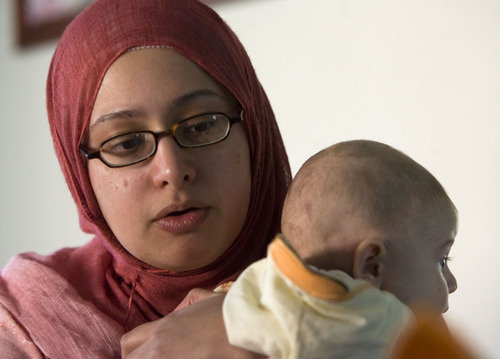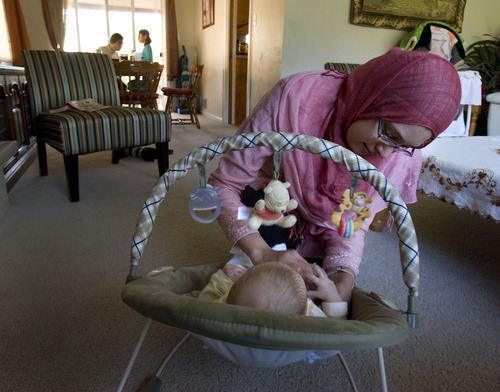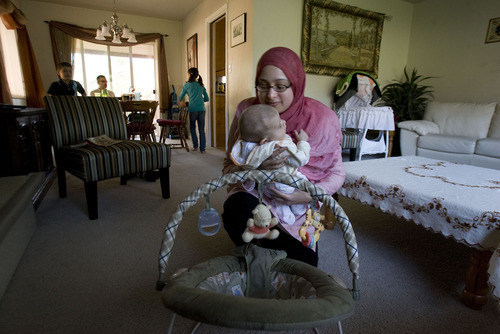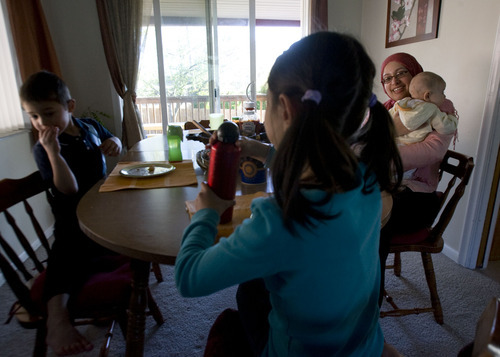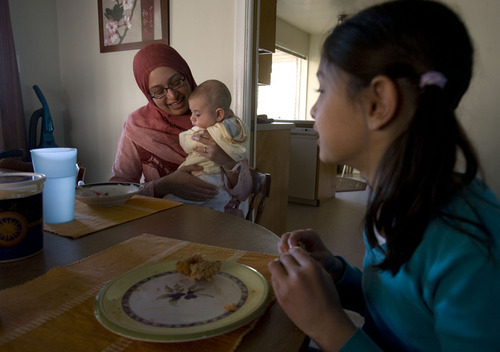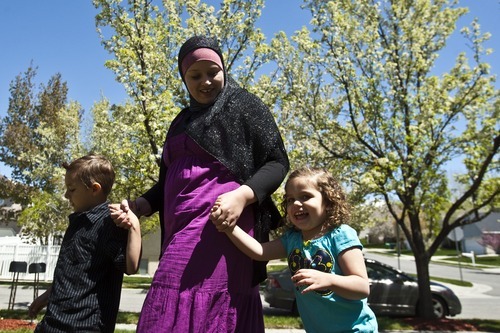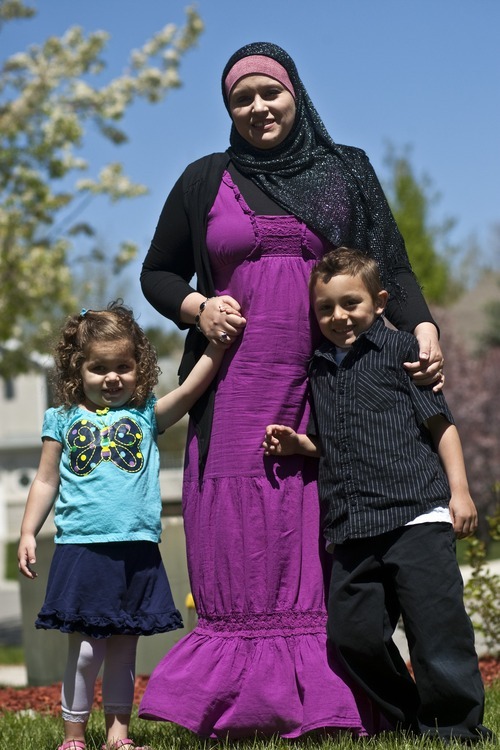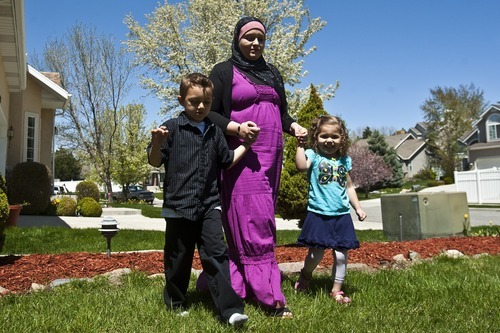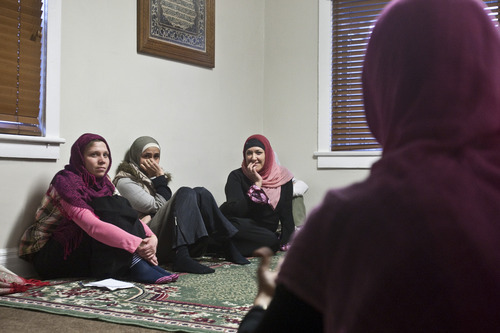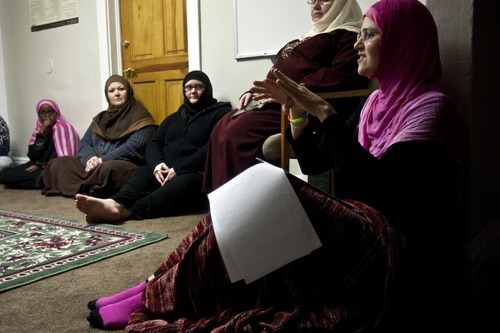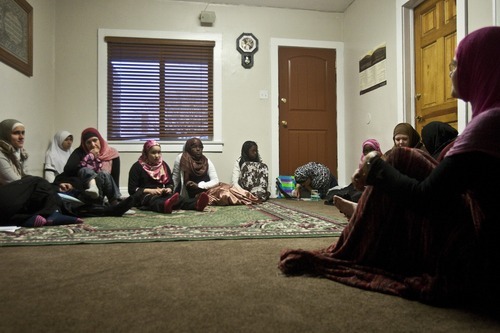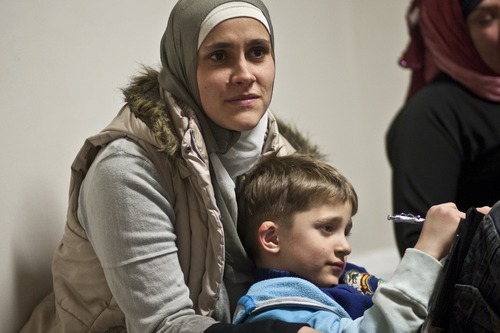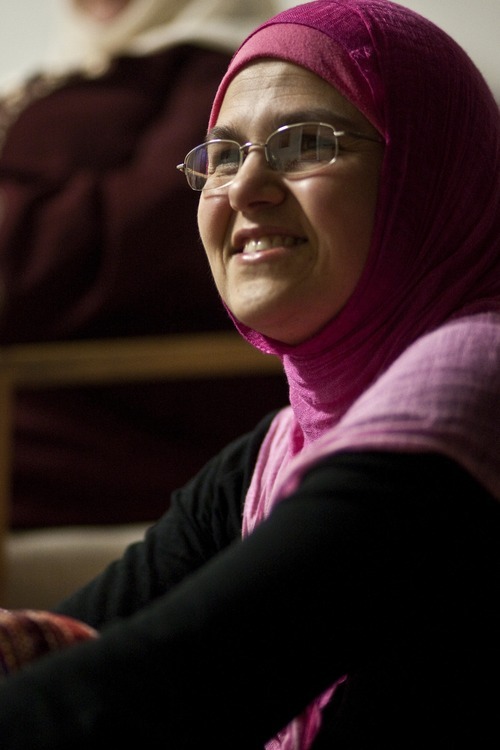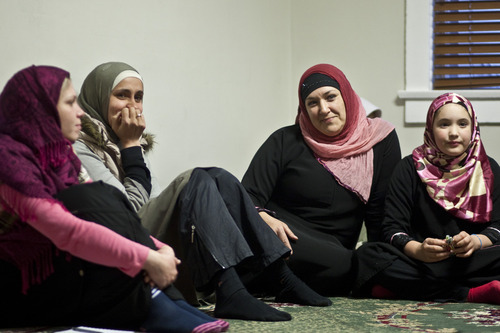This is an archived article that was published on sltrib.com in 2011, and information in the article may be outdated. It is provided only for personal research purposes and may not be reprinted.
To many Americans, Muslim women seem ripe for liberation — either from their so-called domineering husbands or from what some see as their oppressive faith.
To that, Utah's Muslim women say: We're fine, thank you very much.
Indeed, on Mother's Day, that quintessentially American/Hallmark holiday, Muslim women relish their relationships with their husbands and children. In that, they look a lot like any other harried mother in the state.
They are zumba-dancing soccer moms who worry about what their kids eat and watch, whom they play with and how they do in school. Many stay at home full time; others work at hospitals, universities and fast-food chains, in offices and schools, directing traffic and translating texts. They read scriptures on their iPhones and send their kids to Sunday school and summer camp.
Islam, though, does give them a rare perspective on the world and tools to navigate modern challenges.
For starters, many wear head scarves in public, immediately identifying them by their faith. They also have five daily prayers, Quran reading and religious obligations.
At the same time, they share deep connections within the Muslim community, which acts as a kind of extended family for those far away from parents, siblings, grandparents and cousins. These mothers have Islamic teachings and practices to guide them along the way.
"Although in Islam, there are many ways to open the doors of paradise, the vehicle especially chosen for the woman is that of pregnancy, childbirth, nursing and conscientious rearing of her children," writes Aliah Schleifer in Motherhood in Islam. "For every ounce of effort, be it physical, emotional or mental, exerted in this direction, the mother is elevated to a higher position of esteem in the eyes of her family and society."
Unlike Christians who believe God expelled Eve, the first mother, from the Garden of Eden as punishment for disobedience, Muslims teach she was a martyr in a position to face pain and danger for Allah, Schleifer writes. Mothers represent the "ideals of sacrifice, affection and self-denial."
See the accompanying profiles of three Utah Muslims and their approaches to mothering.
Miriam Jaziri
—
Praying with children from birth
Miriam Jaziri and her husband, Alexander Tatari, were born and reared among Germany's tiny Muslim community, she in Hamburg, he in Frankfurt. They met at a college conference, while she was studying education. The couple soon fell in love and, in 2000, wed.
Miriam went on to complete her bachelor's degree, then began a master's program in theater, film and media sciences after their first son, Jonas, now 8, was born. A few years later, Jakob, joined the family. She became a full-time mom, but has considered returning to school for a higher degree or second major.
Living in Germany was OK, she says, but the family did face tightening restrictions on head scarves in school and religious discrimination.
So two years ago, the couple moved to Utah to teach their children English and, she says, because they had heard from friends about the state's legendary niceness.
"They were also Muslims," Miriam says, "and they told us how great it was."
A great place, the Holladay resident says, especially to be a Muslim mom.
In Islam, the mother/child relationship begins moments after a newborn takes a first breath. The Quran teaches that the first words the babe hears should be a prayer, so as the mother cuddles the child in her arms, she whispers, "There is but one God, and Muhammad is his messenger."
Twenty-one days after the birth, Muslim parents are expected to slaughter an animal, usually a goat — two if a boy, one if a girl — and prepare a feast for the community. If they cannot manage the party, they can give equivalent money to the poor.
The Quran also describes the seasons of a child's life and the youngster's relationship to the parents.
For the first seven years, Miriam says, the mother is supposed to "give as much love as she can, kissing, hugging them, offering as much body contact as possible."
The next seven years become the time for religious education, when the child learns Islamic rules, how to pray, and first experiences rituals such as Ramadan.
"That is mostly conducted by the father," Miriam says, "but can involve both parents."
Her youngest is 6, but when he crosses over to the next phase, her husband will play a major role in his Islamic upbringing, "introducing him to the man's world."
If Miriam had a daughter, she would be in charge of her training.
After a child turns 14, parents are "supposed to be a friend of the kids," she says. "They are considered adults. You cannot decide for them anymore. From that time on, they have to make their own choices."
Mothers and mothers-in-law are held in especially high esteem, she says, even non-Muslims.
Miriam's mother was not Muslim, so Miriam was not raised in the Islamic religion. But when Miriam was 10, she decided on her own to practice the faith of her father.
"It was hard on my parents," she says, "but now they are happy for me."
It won't be too many years, according to Islamic tradition, before Miriam's eldest son will face his own decisions.
Arshia Kergaye
—
'My kids are my priority'
Sometimes it takes a lot of cash and effort for a young couple with a newborn to throw a huge party for an area's Muslim community, so Arshia Kergaye and her husband, Cameron Kergaye, just donated the money to the poor when their eldest child, a daughter, was born eight years ago.
It might have been easier in Arshia's native country, India, where the customs and expectations are shared by the community. Or maybe even in Chicago, where she moved with her parents when she was 5 months old.
In Utah, where she moved at the time of her marriage, it was too much. So the couple gave money to the poor, which they did again when each of their next three children was born.
Before the birth of her first child, a daughter, Arshia worked in the Cytogenetics Lab at the University of Utah. She could have gone back to work afterward, but decided against it. "My kids are my priority. I love to be with them."
Thus began Arshia's efforts to teach her children the obligations of the faith.
Almost every night from the time the children were toddlers, they would join their parents in nightly prayer. And soon, she adds, they were saying it themselves.
"You start off having children memorize a nightly prayer, from as young as a year or 2. By the time they are 3 or 4, they should have the prayers memorized," Arshia says. "When a child sees her mother praying, she will mimic her."
She began teaching her daughter the language of the Quran — Arabic — at about age 4½; now, at 8, the girl is fairly fluent. Mother and daughter try to read together at least a half page a day in the holy book.
Arshia monitors computer time and TV watching (she has parent locks on most channels and no cable).
"I pay really close attention," she says, "to what I allow them to do."
The conscientious mother never bought her daughter a big-bosomed Barbie, but others gave the dolls to the child as a gift.
"I had Barbies, and I played with them," Arshia says. "I wasn't going to make a big deal out of it for my daughter. Now she's outgrown them."
It is helpful that most of Arshia's neighbors in Millcreek believe in modest clothing. Plus, her daughter has several cousins who wear head scarves and dress appropriately at her same school.
"When girls reach puberty," she says, "it is generally required that they start wearing a scarf in public."
Like their counterparts in all faiths, Muslim mothers fill many roles, Arshia says. "We are educators. We set an example for our children. We are responsible for guiding them."
These moms are just as eager as all parents to make sure they rear "good, responsible, healthy, balanced children," she says, "who can grow up to be good adults who can contribute to society."
Sharifa Al-Qaaydeh
—
'I knew I would be stereotyped'
The Prophet Muhammad has a saying that "the gates of heaven lie beneath the mother's feet," notes Utah-born Sharifa Al-Qaaydeh.
That and a host of other quotes from Muhammad underscore the reverence for mothers in Islam, says Sharifa, a second-generation Utah Muslim. Her mom, who was LDS, converted to Islam after marrying her Palestinian father.
Sharifa is married to a Jordanian, so when their first child was born, instead of hosting a feast here, the couple gave money so that the family in Jordan could celebrate for them.
The Utah mother finds it ironic that Americans view Muslim women as pitiful victims, while they actually "run the whole system."
Everyone is "scared of mothers-in-law" because they are so powerful, she says somewhat jokingly. "They are the key to the society."
Before the couple married, they discussed the possibility of Sharifa working outside the home and her husband-to-be was supportive. Now she works about three-quarters time as a faculty member at the U.'s School of Nursing.
Her children are young, a 5-year-old son and a 3-year-old daughter, but the mother already is thinking about the issue of dating. Muslims don't, she says. "I didn't and I survived."
Sharifa dressed modestly while attending Bountiful High, but didn't start wearing a head scarf until she graduated.
"I knew I would be stereotyped so it took me a while to build up to it," she says. "Now it has made me a better person. I have to watch what I do because I am in the public eye."
Her husband, Mohammad Al-Qaaydeh, teaches the children Arabic in their Cottonwood Heights home, because Sharifa is not yet fluent in it. Both parents lead prayers and let their children watch and participate, when they can. But she goes to the soccer games and dance recitals.
They will face the head-scarf issue when her daughter hits puberty.
"I am setting an example for her and would want her to," Sharifa says. "But I hope she would come to it on her own."


